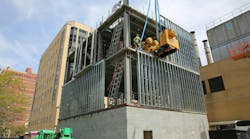The National Electrical Manufacturers Association (NEMA) recently received approval of its distribution equipment standard from the American National Standards Institute (ANSI). ANSI/NEMA AB 3-2013 covers molded case circuit breakers and molded case switches, single-pole and multi-pole, fused and unfused, and their accessories. These circuit breakers and switches are assembled as integral units in supporting housings of insulating material and have rated voltages up to and including 1000V, 50/60Hz, AC or AC/DC, and have rated interrupting current ratings of 5000a or more. Updates to this publication include the addition of photovoltaic circuit breakers, National Electrical Code references, and diagrams.
ANSI/NEMA AB 3-2013 may be downloaded at no charge. A hard copy may be purchased for $94 by visiting global.ihs.com, or contacting IHS by phone at (800) 854-7179 (United States only) or (303) 397-7956 (international).


